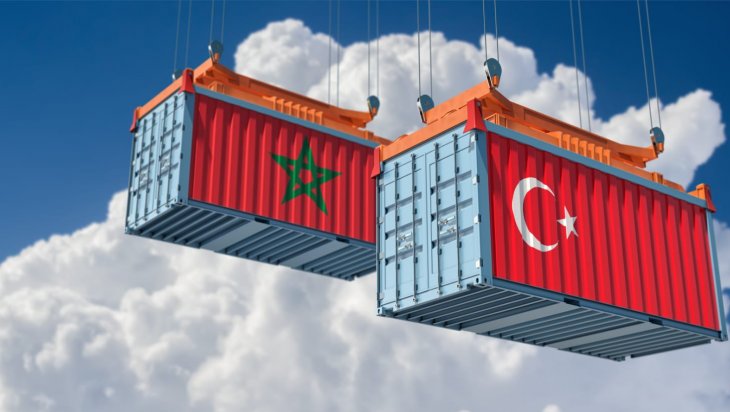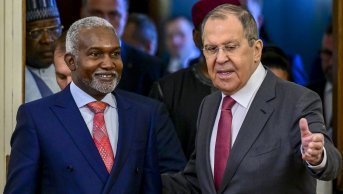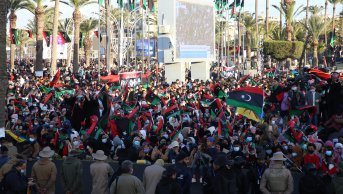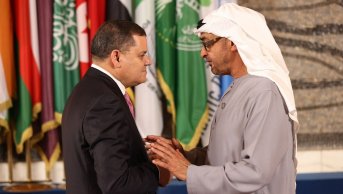Saudi Arabia Casting Shadow Over Morocco-Turkey Economic Relations

After the UAE, together with Saudi Arabia, announced their support for Morocco in the Western Sahara crisis, Crown Prince Sheikh Mohammed bin Zayed Al Nahyan said on 29th October that they recognized Morocco's sovereignty in Western Sahara and were preparing to open a consulate in El Aaiún. Appreciating the UAE's stance in international crises, Morocco's King Mohammed VI stressed that the UAE's decision would pave the way for relations between the two countries.
Following this statement, the UAE became the first Arab country to open a consulate in Western Sahara with a ceremony attended by Nasser Bourita, the Moroccan Foreign Minister, and his counterpart, Abdullah Bin Zayed, on the 5th of November. Receiving for the first time the support of a non-African country in this regional crisis, which has been one of Morocco's national security issues since 1975, has strengthened Morocco's hand in the international arena against the rebel Polisario Front and Algeria.
The developments of the last two weeks are worthy of attention for understanding the background of Turkey-Morocco relations that have become more tense with the changes made to the free trade agreement (FTA) by the Moroccan government. Saudi Arabia has the tendency and desire to spread its unofficial practices and boycott campaign against Turkish products in the country to all Arab countries. Morocco, with which Turkey has intensive trade and economic relations, has been the final destination of Saudi Arabia's boycott campaign.
In this sense, the amendments made to the FTA by Morocco, which the Saudi Arabia-UAE bloc wanted to direct economically and politically towards an anti-Turkey line, have brought the relations between Turkey and Morocco to the point which the Saudi-led bloc sought.
Turkey-Morocco Free Trade Agreement and Effects of the Amendments Made Thereto
The FTA between Turkey and Morocco, concluded with the aim of increasing the volume of trade and enhancing the economic relations between the two countries, has been in force since 2016. The bilateral trade volume amounted to USD 3 billion in 2019, while it was USD 513 million in 2005, before the entry into force of the agreement. The mutual trade between Turkey and Morocco covers many sectors and in particular textiles, food and various industrial goods.
However, Morocco imposed a 90% additional customs duty on 1,200 Turkish products in 150 different categories in the industrial, food and textile sectors for 5 years with the approval of the amendments to the FTA by the Moroccan Council of Ministers on 14th October.
The revision of the FTA between Turkey and Morocco was a highly controversial topic in the country since it was brought to the agenda last year. Those advocating the revision and renewal of the agreement highlighted Morocco's gradually increasing trade deficit with Turkey from the conclusion of the agreement. Some local sources even claimed that quality Turkish branded products entered the Moroccan market with a low-price policy and occupied the share of local producers, thus resulting in the loss of many business lines.
Concerning this issue, Moulay Hafid Elalamy, Minister of Industry, Trade & New Technologies, described the USD 1.217 billion trade deficit against Turkey in 2018 as a loss and stated that they would make the necessary arrangement as soon as possible.
It must not however be forgotten that quite a few of the Turkish textile companies that operate in Morocco make most of their production within the borders of Morocco. Big food chain stores, on the other hand, procure more than half of the products they sell from local producers, thereby making a significant contribution to the national economy. Indeed, the finance executive of BIM, one of the most criticized Turkish brands in the country, stated that they procured 85% of the products sold in their stores from Morocco, and the remaining 15% from Turkey. Stating that they created job opportunities for a total of 3,000 people in 500 stores across Morocco, the company executive underlined that almost all of the employees were Moroccan citizens.
Contrary to the perception created by the pro-Saudi Arabian media in the country, the perception of Turkish goods in Morocco evokes a "quality product" and the products receive significant demand. Minister Elalamy's threat to close some Turkish food chains met with serious reactions in the country and, immediately after the Minister's statement, many users on social media accused Elalamy of protecting the interests of Moroccan hypermarkets which could not compete with affordable, quality Turkish products.
The changes made to the FTA have not only blocked Turkish brands, but also prevented Moroccan people from accessing low-priced, high-quality products.
Saudi Arabia's Boycott Campaigns against Turkish Products and Expectations for Morocco
Saudi Arabia wants to spread its boycott of Turkish products at customs gates and in local stores to other Arab countries, and seeks as well to exploit the gap arising from the customs barriers imposed on Turkish brands and products in a strong market such as Morocco.
On the 3rd of October, Ajlan Al Ajlan, Chairman of the Chamber of Commerce, stressed in a tweet that boycotting Turkey in all areas such as import, export, tourism and investment was the responsibility of all Saudi merchants and consumers in response to the Turkish government's continued hostility towards their country and its citizens.
Saudi Arabia, which later adopted an aggressive smear campaign against Turkish products, quickly spread the headline “boycott Turkish goods” on Twitter via “Fly” accounts. This situation has constantly been on the agenda of the neighbouring Arab countries such as Morocco and Algeria, maintaining the heat of the debate.
Morocco's distanced attitude in the Qatari crisis, its critical stance against the Saudi intervention in Yemen and a Western Sahara documentary broadcast on the Saudi TV channel Al-Arabiya caused political relations between the two countries to become tense. However, economic relations between the two countries have gained considerable momentum over time, with Saudi Arabia increasing its investment in Morocco and providing financial support for some public projects there. Saudi Arabia's positive response to Morocco's search for international support after Algeria's campaigns in some African countries during the Western Sahara crisis also paved the way for improving political relations between the two countries, with many people having the impression that Morocco would join the Saudi-UAE camp. Changes to the free trade agreement that followed immediately after Saudi Arabia's boycott campaigns are being cited as a manifestation of this perception.
In terms of timing, it can be said that the Saudi-UAE bloc takes steps towards the conclusion of a normalization agreement between Morocco and Israel. Indeed, on 29th October, Eli Cohen, Israeli Intelligence Minister, announced that they were trying to normalize relations with 5 more Arab countries, among which he named Morocco, and that this would become official in a short time. From this viewpoint, the UAE's opening of a consulate in El Aaiún after 4 days is bringing along some controversy.
Conclusion
Turkey-Morocco relations entered a tense period with the changes made to the FTA by Morocco at the end of October. Saudi Arabia is seeking to damage the Turkish economy by spreading its campaign against Turkish goods to all Arab countries and first started this within its own borders. Saudi Arabia has tried to draw public attention in Morocco to Turkey's so-called expansionist policies.
This debate has no public resonance and this decision is made on purely political grounds and both seek to prevent Turkish products, which are synonymous with quality goods throughout the Middle East and North Africa, from reaching Moroccan consumers at low prices.










